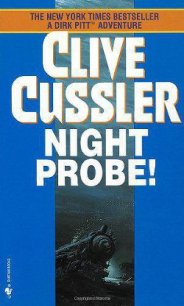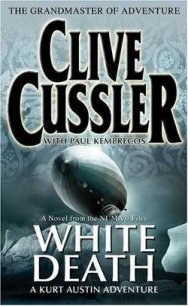Zero Hour - Cussler Clive (книга читать онлайн бесплатно без регистрации TXT) 📗
“Did you see who it was?” Kurt asked. “Where they came from?”
“No,” Bradshaw managed. He seemed about to fade out.
“We have to get you out of here,” Kurt said, trying to lift the big man. “Joe, help me.”
Joe ducked under one of Bradshaw’s arms while Kurt ducked under the other.
“Hayley…” Bradshaw mumbled.
Kurt looked around. He didn’t see her among the dead. “Was she with you?”
Bradshaw nodded. “She went down.” He pointed toward the lake. “She went down with the other diver.”
“What’s down there?”
“A structure of some kind. We thought it might be the device. But it’s huge. More like… some kind of lab. She went down to look because only she would know. But they hit us, and then…”
“And then what?”
The chief wavered but recovered, his face displaying great pain.
“And then they went down after her,” he said. “They’re down there now. All of them.”
NINE
Kurt and Joe dragged Bradshaw to a spot by one of the SUVs. He had three bullet wounds. He’d lost a lot of blood. Kurt doubted he would survive for long.
He grabbed a first-aid kit and tossed it to Joe.
“Do what you can for him,” he said. “And find a way to call for help. If you can’t reach anyone, get him out of here.”
“What are you going to do?”
Kurt was climbing onto the back of the flatbed, yanking the tarp off the one-man submersibles. “I’m going in.”
“But you don’t know what’s down there.”
“A laboratory and a device,” Kurt said, repeating Bradshaw’s cryptic explanation as he dropped from the side of the flatbed and landed back down on the beach. “And a young woman who’s in way over her head.”
“So what are you going to do?” Joe asked. “Just swim around looking for this device?”
Kurt jumped back into the cab of the boxy truck and turned the key. “No,” he said. “I’m going to drive.”
The big diesel rumbled to life. Kurt jammed the truck into gear and began to roll forward. He turned slightly to the left, toward the deadly lake, and pressed down harder on the throttle.
Had anyone but Joe Zavala been watching him, Kurt might have explained in greater detail what was about to happen, but Joe knew vehicles like no one else. He’d eyed the truck strangely at the airport and most likely put two and two together shortly thereafter. If he hadn’t figured it out already, he’d understand any moment now.
The rig accelerated across the slope, its heavy tires carving deep tracks in the soft red sand as Kurt drove it straight into the water. It quickly came up off the wheels and began coasting forward.
As soon as he was afloat, Kurt grabbed a stainless steel lever on the dashboard and forced it upward and over into a notch, where it locked. The truck’s big wheels rose up, pulling free of the water, while a propeller attached to the drive shaft extended from the rear.
Kurt glanced at a monitoring board. All the lights were green. That was good news. It meant the prop was connected to the power train and there were no detectable leaks.
Kurt stepped on the gas. The prop churned the red water behind him, and the amphibious craft began to plow forward, completing its conversion from slow-moving truck to an even slower-moving boat. It drove like a nose-heavy barge, but fortunately Kurt didn’t have far to go.
Flipping another set of switches, Kurt activated a sonar system he’d brought along. A weighted spring kicked the small towed array off the back of the truck. It began to sink, spooling out a cable behind it and bouncing mid-frequency sound waves off the bottom of the lake. A pattern soon appeared on the display screen.
As Kurt moved away from the sloping edge of the pit, the bottom dropped away sharply. The pit was a mile across at the very top but shaped like a giant elongated V, with a wide, flat bottom.
“Six-forty and dropping,” he said to himself as the numbers continued to change. “Let’s see how deep you are.”
The top of the rim was over a thousand feet from the original bottom, but the water level was at least a hundred feet below the rim, and most likely years of erosion had begun to fill in the pit. He noticed a leveling at eight hundred and fifty. It was hard to fathom being in the middle of the desert and floating on a lake so deep that a World War Two submarine would be crushed if it went more than halfway down, but there he was.
At roughly the center of the lake, the sonar picked up a dome-shaped object. It appeared something like a sleek water tower, rising above the cornfields of the Midwest, bulbous at the top, with a group of pipes descending from the bottom in a tight bunch. As far as Kurt could tell, they went right down into the center of the lake bed.
He wondered what he was looking at. What was its purpose?
Bradshaw had used the term device, which conjured up images of a nuclear warhead of some kind. Unfortunately, in today’s day and age, one didn’t need to build a giant tower with a sixty-foot dome on top to unleash atomic fury.
The dome passed out of sight and a new target came into view. This one didn’t have the curving, artistic lines of the dome. It looked more like a pile of cylindrical pods and shipping containers stacked on top of one another. From top to bottom, it was the height of a seven-story building. It appeared to be anchored to the steeper wall of the lake and connected to the dome by gantries and thick cables. An intermittent response on the sonar suggested guide wires anchoring it to the wall.
The roof of this structure sat near a depth of two hundred and fifty feet, the bottom checked in below three hundred and twenty. The dome loomed above it and off to one side.
Kurt was grudgingly impressed. Building a structure like this at a depth of three hundred feet was quite a task to begin with. To do it in a toxic lake, in secret… He was more than grudgingly impressed.
He took his hand off the throttle, and the amphibious rig coasted to a halt near the center of the lake. Kurt got out of his seat and climbed onto the flatbed behind him.
He was directly over the main structure. Now all he had to do was get down there.
Joe spent a few minutes tending to Bradshaw and trying to patch him up with the meager offerings of the first-aid kit. Despite the effort, Bradshaw looked bad, ghostly pale, with skin that was cool to the touch. He needed real attention and he needed it soon.
Joe left Bradshaw and began to rummage around in the SUV beside them. He grabbed a handheld radio and turned it on. The LED, which should have lit up nice and green, remained dark. Joe fiddled with the power switch a few times and then keyed the mike. He got nothing: no squelch, no static. The battery was dead.
Looking for a charger, Joe noticed that the keys were still in the SUV’s ignition. He also noticed that both doors were open and yet the dome lights were dark, and the dash wasn’t emitting any kind of annoying ping.
He reached over and turned the key. He twisted it to OFF and then back to the ACC position. Nothing changed. No warning lights, no voice telling him the door was ajar, nothing.
“That’s odd.”
He climbed out of the SUV and grabbed his rifle. Moving quickly from one vehicle to the next, he checked them all. Each one of them was as dead as the last.
Six new vehicles. Not one with an ounce of juice. A rack of radios and two cell phones in the same condition. A flashlight in the glove box of the last vehicle had just enough power to make the old-style filament glow for a second or two, but then it too went dark.
Joe felt the hair on the back of his neck stand up. He glanced at the sky. This was exactly the kind of thing that happened right before the mother ship arrived.
He moved back to Bradshaw. “Why are all the batteries dead?”




